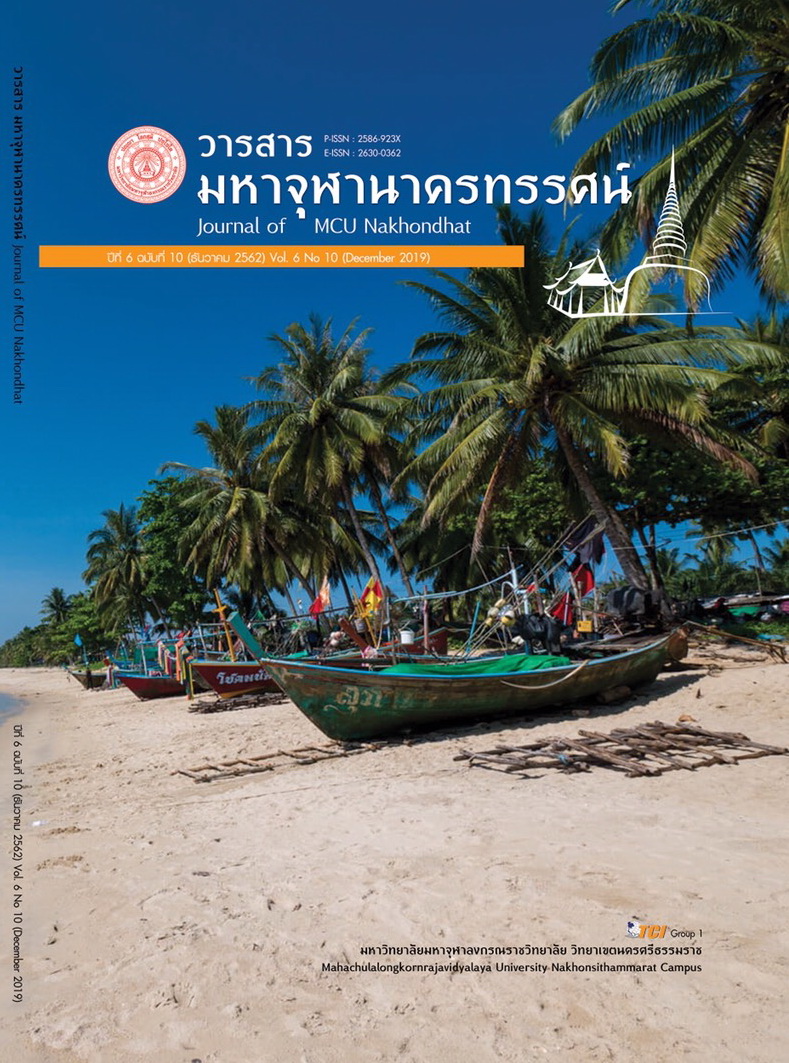บุพปัจจัยที่มีอิทธิพลต่อการพัฒนาอุตสาหกรรมการท่องเที่ยว ตามหลักฮาลาลในจังหวัดเชียงใหม่
Main Article Content
บทคัดย่อ
การวิจัยครั้งนี้ มีวัตถุประสงค์ คือ 1) เพื่อศึกษาปัจจัยของการพัฒนาอุตสาหกรรมการท่องเที่ยว การโฆษณา การสนับสนุนจากรัฐบาล การตราสินค้าฮาลาล การจัดการสิ่งอำนวยความสะดวก และการพัฒนาอุตสาหกรรมท่องเที่ยวตามหลักฮาลาล ในจังหวัดเชียงใหม่ 2) เพื่อศึกษาการโฆษณา การสนับสนุนจากรัฐบาล การตราสินค้าฮาลาล การจัดการสิ่งอำนวยความสะดวก ที่มีอิทธิพลต่อการพัฒนาอุตสาหกรรมท่องเที่ยวตามหลักฮาลาล ในจังหวัดเชียงใหม่ ใช้ระเบียบวิธีวิจัยแบบผสมวิธี (Mixed Method Research) คือ การวิจัยเชิงปริมาณ กลุ่มตัวอย่าง ได้แก่ นักท่องเที่ยวชาวไทยและชาวต่างชาติที่เป็นมุสลิมและเดินทางมาท่องเที่ยวและพักค้างคืนในจังหวัดเชียงใหม่ไม่น้อยกว่า 1 คืน จำนวน 384 คน โดยใช้สูตรของคอแครน เครื่องมือที่ใช้ในการวิจัย คือ แบบสอบถาม สถิติที่ใช้ในการวิเคราะห์ข้อมูล ได้แก่ สถิติเชิงพรรณนา และสถิติการวิเคราะห์แบบจำลองสมการโครงสร้าง การวิจัยเชิงคุณภาพ ใช้การสัมภาษณ์แบบเจาะลึก จากผู้ให้ข้อมูลสำคัญ 7 กลุ่ม จำนวน 17 คน นำข้อมูลทั้งหมดมาวิเคราะห์ในภาพรวม เพื่อนำมาสนับสนุนการวิจัยเชิงปริมาณ
ผลการวิจัยพบว่า
- ปัจจัยของการพัฒนาอุตสาหกรรมการท่องเที่ยว การโฆษณา การสนับสนุนจากรัฐบาล การตราสินค้าฮาลาล การจัดการสิ่งอำนวยความสะดวก และการพัฒนาอุตสาหกรรมท่องเที่ยวตามหลักฮาลาล ในจังหวัดเชียงใหม่ โดยภาพรวมอยู่ในระดับมาก เรียงจากมากไปหาน้อย ดังนี้ ด้านการตราสินค้าฮาลาล มีค่าเฉลี่ยเท่ากับ 3.93 ด้านการพัฒนาอุตสาหกรรมท่องเที่ยวตามหลักฮาลาล มีค่าเฉลี่ยเท่ากับ 3.89 ด้านการโฆษณา มีค่าเฉลี่ยเท่ากับ 3.84 ด้านการสนับสนุนจากรัฐบาล มีค่าเฉลี่ยเท่ากับ 3.83 และด้านการจัดการสิ่งอำนวยความสะดวก มีค่าเฉลี่ยเท่ากับ 3.81 ตามลำดับ
- การโฆษณา การสนับสนุนจากรัฐบาล การตราสินค้าฮาลาล การจัดการสิ่งอำนวยความสะดวก ที่มีอิทธิพลต่อการพัฒนาอุตสาหกรรมท่องเที่ยวตามหลักฮาลาล ในจังหวัดเชียงใหม่ พบว่า ปัจจัยที่มีอิทธิพลต่อการพัฒนาอุตสาหกรรมการท่องเที่ยวตามหลักฮาลาล โดยรวมมากที่สุด ได้แก่ การตราสินค้าฮาลาล โดยมีค่าน้ำหนักองค์ประกอบแบบปรับมาตรฐานโดยรวมเท่ากับ 0.916 รองลงมา ได้แก่ การจัดการสิ่งอำนวยความสะดวก มีค่าน้ำหนักองค์ประกอบแบบปรับมาตรฐานโดยรวมเท่ากับ 0.810 การสนับสนุนจากรัฐบาล มีค่าน้ำหนักองค์ประกอบแบบปรับมาตรฐานโดยรวมเท่ากับ 0.642 โดย ที่การโฆษณา มีค่าน้ำหนักองค์ประกอบแบบปรับมาตรฐานโดยรวมเท่ากับ 0.225 ตามลำดับ และเมื่อพิจารณาอิทธิพลโดยอ้อม พบว่าปัจจัยที่มีอิทธิพลต่อการพัฒนาอุตสาหกรรมการท่องเที่ยวตามหลักฮาลาลโดยอ้อมสูงที่สุด ได้แก่ การตราสินค้าฮาลาล โดยมีค่าน้ำหนักองค์ประกอบแบบปรับมาตรฐานโดยรวมเท่ากับ 0.806 รองลงมา ได้แก่ การสนับสนุนจากรัฐบาล มีค่าน้ำหนักองค์ประกอบแบบปรับมาตรฐานโดยรวมเท่ากับ 0.566 และการโฆษณา โดยมีค่าเท่ากับ 0.215 ตามลำดับ โดยที่ไม่มีอิทธิพลทางอ้อมส่งผ่านการจัดการสิ่งอำนวยความสะดวกแต่อย่างใด
Article Details
เอกสารอ้างอิง
ชูสิทธิ์ ชูชาติ. (2553). คู่มือการท่องเที่ยวในมิติเศรษฐกิจพอเพียง. เชียงใหม่: มหาวิทยาลัยเชียงใหม่.
เทิดชาย ช่วยบำรุง. (2552). รวมบทความวารสารวิชาการการท่องเที่ยวไทย-นานาชาติ ปี พ.ศ.2550. กรุงเทพมหานคร: สถาบันวิจัยเพื่อพัฒนาการท่องเที่ยวไทย.
นวฤทธิ์ อัคควรกิจ. (2551). กลยุทธ์การสร้างสรรค์งานโฆษณา. (พิมพ์ครั้งที่ 3). กรุงเทพมหานคร: สำนักพิมพ์ มหาวิทยาลัยกรุงเทพ.
วิภาวัลย์ วรพุฒิพงค์. (2561). ผุดฮาร์โมไนซ์ รร.ฮาลาลในเชียงใหม่. เรียกใช้เมื่อ 11 เมษายน 2561 จาก https://www.thansettakij.com/business/tourism?utm_source=menu_header&utm_medium=internal_referral
วิรัช ลภิรัตนกุล. (2553). การประชาสัมพันธ์ (พิมพ์ครั้งที่ 12 ฉบับสมบูรณ์). กรุงเทพมหานคร: สำนักพิมพ์แห่งจุฬาลงกรณ์มหาวิทยาลัย.
ศราวุฒิ อารีย์. (2559). การท่องเที่ยวฮาลาลและศักยภาพของไทย. เรียกใช้เมื่อ 25 เมษายน 2561 จาก https://www.halal.or.th/stbook
สถาบันฮาลาล มหาวิทยาลัยสงขลานครินทร์. (2560). ภาพรวมของอุตสาหกรรมฮาลาลในประเทศไทย. เรียกใช้เมื่อ 5 กรกฎาคม 2561 จาก https://www.halinst.psu.ac.th.
สำนักข่าวมุสลิมไทยโพสต์. (2559). การบริหารจัดการการท่องเที่ยวเพื่อตอบสนองความต้องการของชาวมุสลิม. เรียกใช้เมื่อ 10 เมษายน 2561 จาก https://news.muslimthaipost.com
สำนักงานคณะกรรมการพัฒนาการเศรษฐกิจและสังคมแห่งชาติ. (2555). แผนพัฒนาเศรษฐกิจและสังคมแห่งชาติ ฉบับ ที่ 11 (พ.ศ.2555 - 2559). กรุงเทพมหานคร: สำนักงานคณะกรรมการพัฒนาการเศรษฐกิจและสังคมแห่งชาติ.
อุมาพร บึงมุม. (2559). การจัดสรรเงินงบประมาณสำหรับอาหารฮาลาล. กรุงเทพมหานคร: สำนักงบประมาณของรัฐสภา.
Cochran, W. C. (1963). Sampling Techniques. New York: John Wiley & Sons.
Nursanty, E. (2013). Halal Tourism, New Product in Islamic Leisure Tourism and Architecture. In Degree Program in Tourism. University of Applied Sciences.


